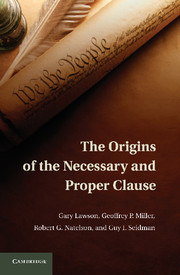Book contents
- Frontmatter
- Contents
- Acknowledgments
- 1 Raiders of the Lost Clause
- 2 Discretionary Grants in Eighteenth-Century English Legislation
- 3 An Ocean Away
- 4 The Legal Origins of the Necessary and Proper Clause
- 5 The Framing and Adoption of the Necessary and Proper Clause
- 6 Necessity, Propriety, and Reasonableness
- 7 The Corporate Law Background of the Necessary and Proper Clause
- Index
- References
6 - Necessity, Propriety, and Reasonableness
Published online by Cambridge University Press: 03 May 2011
- Frontmatter
- Contents
- Acknowledgments
- 1 Raiders of the Lost Clause
- 2 Discretionary Grants in Eighteenth-Century English Legislation
- 3 An Ocean Away
- 4 The Legal Origins of the Necessary and Proper Clause
- 5 The Framing and Adoption of the Necessary and Proper Clause
- 6 Necessity, Propriety, and Reasonableness
- 7 The Corporate Law Background of the Necessary and Proper Clause
- Index
- References
Summary
As the previous two chapters have illustrated, reasonable eighteenth- century American drafters and readers would have considered, and actual drafters and readers did consider, private agency law, including norms of fiduciary duty and the doctrine of principals and incidents, as part of the background that helped define a legal phrase such as “necessary and proper for carrying into Execution.” The Constitution, of course, is a “public law” rather than “private law” document; it was a charter for government, not the appointment of a factor or guardian. As it happens, however, that public-law character strengthens rather than weakens the evidence mustered by Professor Natelson in favor of understanding the Necessary and Proper Clause through the lenses of agency law and fiduciary duty. In addition to background principles of private law that help explain the Necessary and Proper Clause, there were background principles of public law that would have been known to an informed eighteenth-century observer that shed important light on the clause's origins. Those principles are a remarkably elegant fit with the agency law and fiduciary origins of the Necessary and Proper Clause.
To fill in this piece of the story, we move from agency law to administrative law. By the eighteenth century, English law had developed a bedrock principle of public administration that today is known as the principle of reasonableness.
- Type
- Chapter
- Information
- The Origins of the Necessary and Proper Clause , pp. 120 - 143Publisher: Cambridge University PressPrint publication year: 2010



